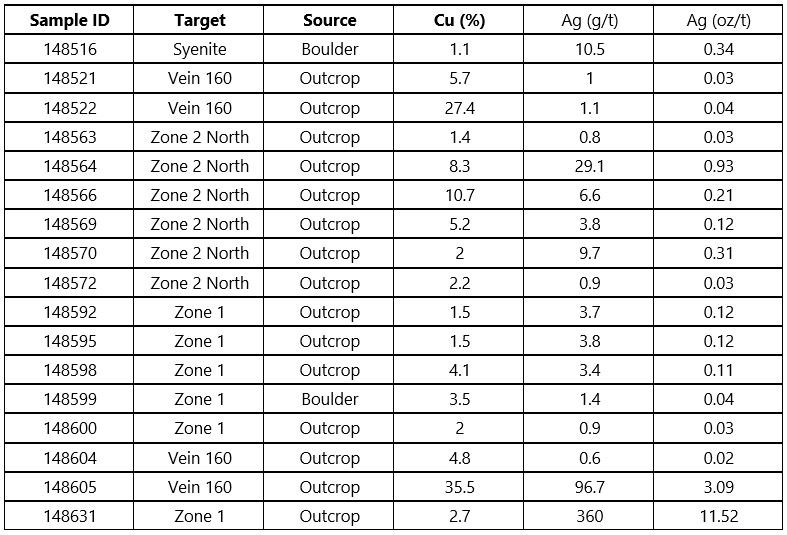Pegasus Resources Samples Multiple High-Grade Cu-Ag Zones at Vertebrae Ridge Including Separate Sample Assays of 35.5 % Cu AND 360 g/t Ag
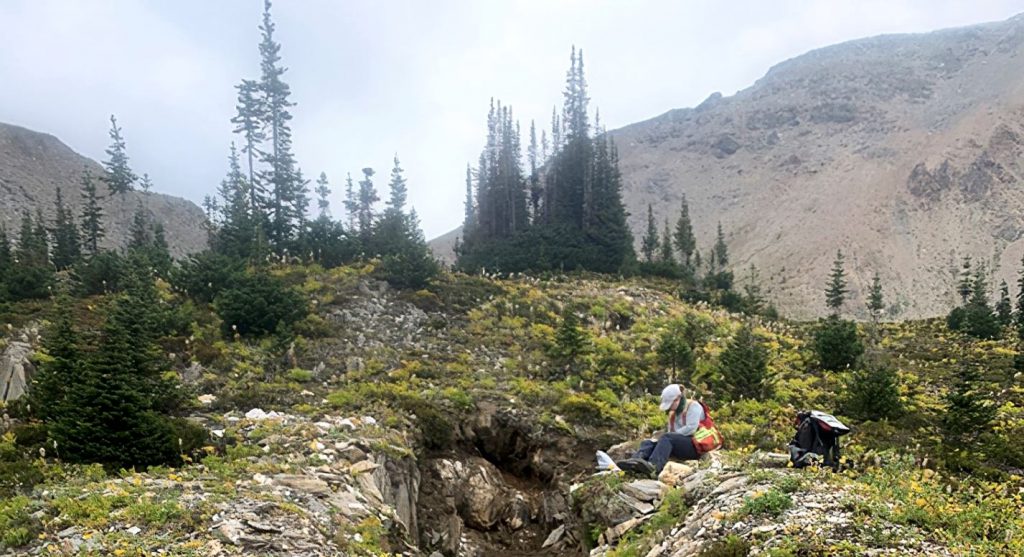
Pegasus Resources Inc. (TSX-V: PEGA; Frankfurt – OQS2, OTC/Pink Sheet symbol SLTFF) (the “Company” or “Pegasus”) is pleased to announce additional results (see January 13, 2021 news release) from the fall 2020 prospecting program carried out on its Golden Project, consisting of the Gold Mountain, Punch Bowl and Vertebrae Ridge properties, located north of Golden, British Columbia. The Company may earn a 100% interest in the Golden Project subject to the terms of an option agreement dated September 9, 2020 (see September 10, 2020 news release)
Vertebrae Ridge Property
The Vertebrae Ridge Property is comprised of two claims totaling 2,871 ha (7,094 acres) approximately 81 km northwesterly from Golden, British Columbia. A prospecting program during fall 2020 resulted in the discovery and identification of significant polymetallic mineralization at multiple locations, including:
Zone 1
• 18 rock samples collected over a 1,400+ metre strike with sample assays of 4.13% Cu, 28.6% Pb, 4.74% Zn, and 360 g/t Ag;
• Exhibits anomalous concentrations of As, Hg and Sb, in addition to Cu, Pb, Zn and Ag;
Zone 2 North
• 13 rock samples collected over a 650+ metre strike returned an arithmetic average of 2.5% Cu and 4.5 g/t Ag, with peak values of 10.7% Cu and 29.1 g/t Ag; and
Vein 160 Showing
• 7 rock samples collected over an approximate 250 metre strike returned an arithmetic average of 10.5% Cu and 14.7 g/t Ag, with peak values of 35.5% Cu and 96.7 g/t Ag.
Charles Desjardins, Chief Executive Officer of Pegasus, comments, “The copper-silver mineralization at the Vertebrae property represents an exciting new discovery within a virtually unexplored district of east-central British Columbia. At a time when copper is seeing increased demand from a world transitioning to electric energy, new discoveries will be required to sustain the momentum of the world’s energy transformation. These assays in conjunction with the Gold Mountain and Punch Bowl assays (news release January 13, 2021) creates an exciting district play in which Pegasus shareholders have the right to earn 100%.”
Zone 1
The Cu-Ag mineralized system, described in a prior news release (January 6th, 2021) as Copper Zone 1, was confirmed over a 1,400+ metre length (see Figure 1) and ranges from approximately 2 to 5 metres in width. The mineralization appears associated with polymetallic quartz-carbonate veins, is open in all directions, and is orientated southeast-northwest. The veins cross-cut altered limestone, dolostone, and mudstone.
The polymetallic nature of the veins, their extent, and the unique chemistry suggest that closer examination and evaluation are required prior to extrapolating a deposit type. Of the 18 grab rock samples collected, a total of 7 assayed between 1.48 and 4.13% Cu. Sample 148631 contained significant polymetallic mineralization with 2.72% Cu, 28.6% Pb, 4.74% Zn, and 360 g/t Ag. Anomalous As, Hg, and Sb is also noted from a subset of the samples.
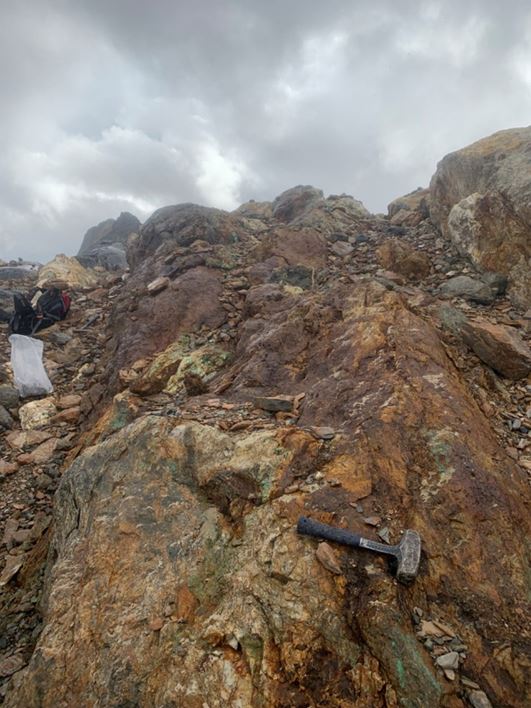
Zone 2 (North and South)
Mineralization at Zone 2 North was examined over a strike length of approximately 650+ metres with widths approaching 2 metres. A total of 13 rock samples were collected from this location, returning an arithmetic average of 2.5% Cu and 4.5 g/t Ag, with peak values of 10.7% Cu and 29.1 g/t Ag. An additional five samples were collected from Zone 2 South, located on trend but over 1,500 metres further south from Zone 1 North, returned values of up to 0.5% Cu and 2.9 g/t Ag. The extent of mineralization at Zone 2 South is currently unknown, although mineralized outcrops approach 1 metre in width.
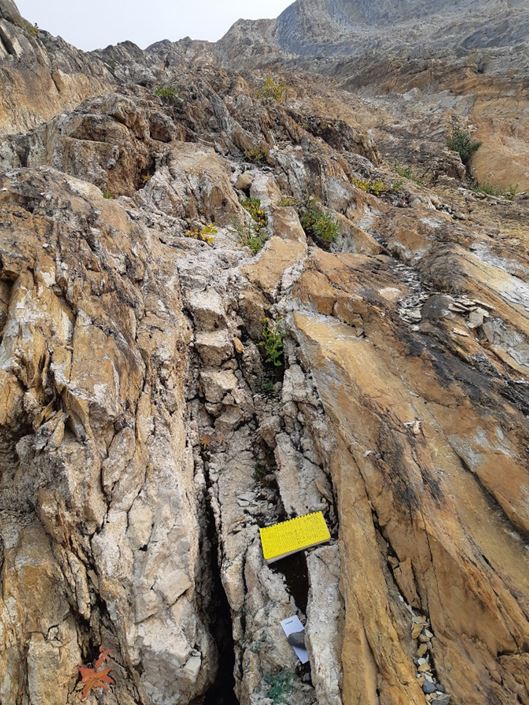
The Cu-Ag mineralization at Zone 2 appears restricted to a single lithology that is up to 2 metres across. The anomalous Cu-Ag geochemistry and extent of the mineralization suggest the mineralization may represent a sedimentary Cu occurrence or a replacement style deposit.
Vein 160 Showing
Vein 160 showing exhibits a maximum width of 1 metre and was examined over a strike length of approximately 250 metres. Multiple carbonate veins hosting chalcocite and malachite were also observed crisscrossing the showing. A total of 7 samples were collected, with peak assays returned of 35.5% Cu and 96.7g/t Ag with an average of 10.5% Cu and 14.7 g/t Ag. As with Zone 2, the geochemistry of the Vein 160 showing implies a sedimentary copper occurrence or carbonate replacement deposit.
Intrusive Units (Syenite)
Syenite bodies identified in a prior news release (January 6th, 2021) were explored over two days, with one sample (148516) reporting strong polymetallic mineralization. This sample consisted of altered feldspar pegmatite and oxidized sulphide blebs. Continued exploration of the syenite occurrences is warranted to determine the extent and degree of mineralization of altered feldspar pegmatites. Though unclear at this time, there may be a relationship between intrusive within the claim group, and the observed mineralization.
A total of 65 samples were collected from outcrop and boulders during the fall 2020 prospecting program, with 17 returning assays which show that systems present at the Vertebrae Ridge Property are strongly mineralized (Table 1). The full dimensions, extent, and number of mineralized systems are currently not well constrained or are unknown.
Table 1: Summary of major mineralized samples from the Vertebrae property collected in in 2020. Note that grab samples are selective by nature and values reported are not representative of mineralized zones.
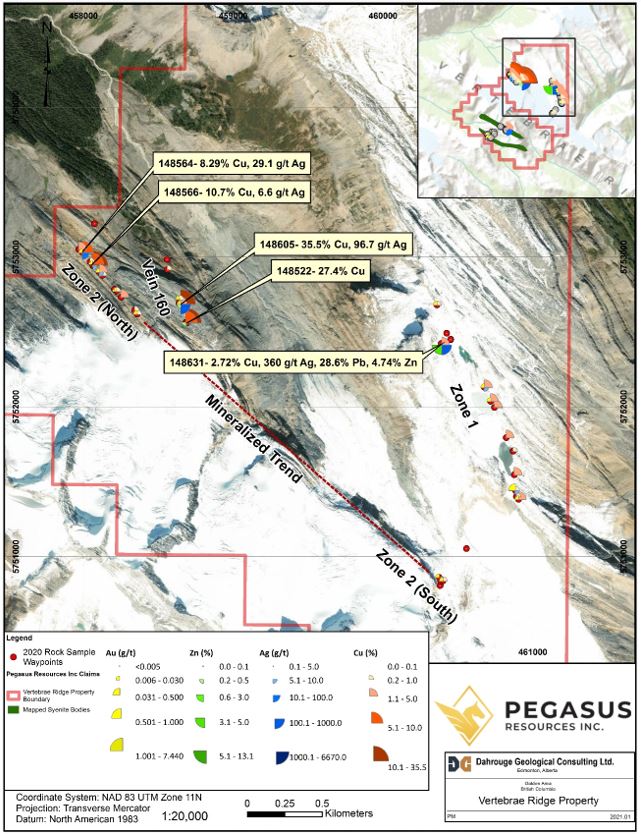
Given the results obtained during the 2020 exploration, the Company looks forward to conducting an aggressive program of both regional exploration and detailed follow-up as soon as conditions permit in the second quarter of 2021.
QA/QC Analytical Procedures
All rock samples and quartz blanks were shipped by ground to Activation Laboratories Ltd. in Kamloops, British Columbia for multielement analysis (including Ag) by two-acid digestion and ICP-OES finish (package 1E3) and Au analysis by fire assay (code 1A2B-30). Overlimits for Ag, Cu, Pb, and Zn were completed by the applicable assay package (code 8-AR ICP-OES). Ag values reporting >100 ppm after additional analysis were resubmitted for gravimetric fire assay (code 8-Ag). No certified reference materials were submitted with the rock samples for analysis with the Company relying on the laboratories internal QAQC in this regard.
Management cautions that surface rock sample assays, as presented herein, are selective by nature and represent a point location, and therefore may not necessarily be fully representative of the mineralized horizon sampled.
NI 43-101 Disclosure
The technical information in this news release was prepared and/or reviewed by Nathan Schmidt, P.Geo. of Dahrouge Geological Consulting Ltd, a Qualified Person as defined in National Instrument 43-101.
About Pegasus Resources Inc.
Pegasus Resources Inc. is a diversified Junior Canadian Mineral Exploration Company with a focus on zinc and base metal properties in North America. The Company is also actively pursuing the right opportunity in other resources to enhance shareholders value. For additional information please visit the Company at www.pegasusresourcesinc.com or contact Charles Desjardins at charles@pegasusresourcesinc.com.
On Behalf of the Board of Directors
Charles Desjardins,
President and Director
Pegasus Resources Inc.
700 – 838 West Hastings Street
Vancouver, BC V6C 0A6
1-604-369-8973
E: info@pegasusresourcesinc.com
Neither the TSX Venture Exchange nor its Regulation Services Provider (as that term is defined in the policies of the TSX Venture Exchange) accepts responsibility for the adequacy or accuracy of this release.
Forward Looking Statements
Statements included in this announcement, including statements concerning of the Company’s plans, intentions and expectations, which are not historical in nature are intended to be, and are hereby identified as, “forward-looking statements”. Forward-looking statements may be identified by words including “anticipates”, “believes”, “intends”, “estimates”, “expects” and similar expressions. The Company cautions readers that forward-looking statements, including without limitation those relating to the Company’s future operations and business prospects, are subject to certain risks and uncertainties that could cause actual results to differ materially from those indicated in the forward-looking statements.

